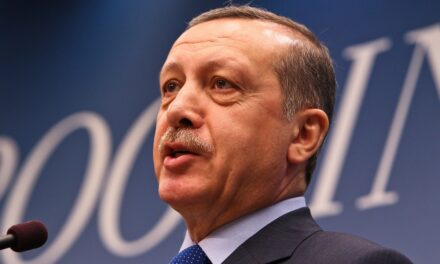We support our Publishers and Content Creators. You can view this story on their website by CLICKING HERE.
Freedom House ranks Finland as the world’s freest country. It is one reason why Finland has become the destination of choice not only for Ukrainians but also for dissidents from farther abroad seeking asylum from the world’s worst dictators in Turkey, Iran, and the Democratic Republic of Congo.
Traditionally the Finnish government does immigration right. It publishes strict protocols and holds applicants accountable, rejecting those who approach immigration officers with false or exaggerated claims.
If only the Finnish judiciary were as diligent. In two recent cases, Finland’s judiciary and perhaps its foreign ministry and politicians have allowed scammers and human rights abusers to weaponize its judiciary as a mechanism for transnational repression and harassment.
Consider the case of Gibril Massaquoi, for example. A former Sierra Leone civil war-era commander, Massaquoi became an important resource for the Special Court for Sierra Leone as it prosecuted war crimes in the West African state. His efforts directly led to several convictions. As the court wound down, Massaquoi sought asylum in Finland. The controversial Swiss NGO Civitas Maxima raised funds as it targeted Massaquoi, leading Finland to arrest him. The problem? Civitas Maxima’s own witnesses acknowledged Civitas Maxima paid witnesses to say they personally saw Massaquoi commit a number of crimes in Liberia. The problem? At the time Massaquoi was under 24/7 guard in Sierra Leone and could not possibly have been guilty. Ultimately, a Finnish court dismissed the case against Massaquoi, but the damage was done: As profiteers and civil war rivals sought revenge, they forced an asylum seeker who had done the right thing into a multi-million dollar process, hijacking the Finnish judiciary for lawfare. To Finland’s credit, they compensated Massaquoi nearly a half million dollars for the harassment he suffered due to the malicious prosecution.
As troubling is the case of Simon Ekpa, the prime minister-in-exile of Biafra. Between 1967 and 1970, Biafra, chafing under Nigeria’s religious and ethnic discrimination, sought to secede. The Nigerian military response was brutal. The Nigerian Army killed up to 100,000 Biafrans outright, and then millions more died due to its land and sea blockade. Rather than be generous in victory, Nigerian leaders continued their repression. Under the rule of Muhammadu Buhari, Nigeria’s president between 1983 and 1985 and again from 2015 and 2023, Nigerian repression grew against ethnic Igbo in Biafra and Nigerian Christians more broadly.
It was against this context that Simon Ekpa, a prominent human rights activist, organized a referendum for Biafra. Tens of millions of Biafrans reportedly voted and overwhelmingly choose independence. Ekpa planned a convention in the coming week for the Declaration of the Restoration of Independence of Biafra. For Biafra to declare independence in Finland may seem strange, but it is not disqualifying. After all, Czechoslovakia’s declaration of independence took place in Washington, DC.
Fortunately, the Czechs never had to worry about Finnish police. In March 2024, as momentum for Biafran independence grew, the Nigerians charged Ekpa and dozens of other activists with terrorism. Last week, the Finns arrested Ekpa despite the spuriousness of Nigerian charges. As Biafrans seek freedom in response to Nigerian repression, it is ironic that the Finns response is to facilitate more repression. Otto Hiltunen, the head of Finnish National Bureau of Investigation, was unapologetic. He accused Ekpa of inciting “violence against civilians and public authorities and in other crimes in south-east Nigeria” by “campaigning, for example, on his social media channels.” What next? Arresting Uyghurs for exposing their abuses at the hands of the Chinese Communist Party? Eritreans who escaped the slavery of the Isaias Afwerki’s regime?
Finland coasts on its reputation of liberalism, human rights, and freedom. When it comes to Africans escaping repression at home, alas, it is a reputation the country no longer deserves.
About the Author: Dr. Michael Rubin
Michael Rubin is a senior fellow at the American Enterprise Institute, where he specializes in Iran, Turkey, and the broader Middle East. A former Pentagon official, Dr. Rubin has lived in post-revolution Iran, Yemen, and both pre- and postwar Iraq. He also spent time with the Taliban before 9/11. For more than a decade, he taught classes at sea about the Horn of Africa and Middle East conflicts, culture, and terrorism, to deployed US Navy and Marine units. Dr. Rubin is the author, coauthor, and coeditor of several books exploring diplomacy, Iranian history, Arab culture, Kurdish studies, and Shi’ite politics, including “Seven Pillars: What Really Causes Instability in the Middle East?” (AEI Press, 2019); “Kurdistan Rising” (AEI Press, 2016); “Dancing with the Devil: The Perils of Engaging Rogue Regimes” (Encounter Books, 2014); and “Eternal Iran: Continuity and Chaos” (Palgrave, 2005). Dr. Rubin has a PhD and an MA in history from Yale University, where he also obtained a BS in biology. The views and opinions expresses are the author’s own.

 Conservative
Conservative  Search
Search Trending
Trending Current News
Current News 





